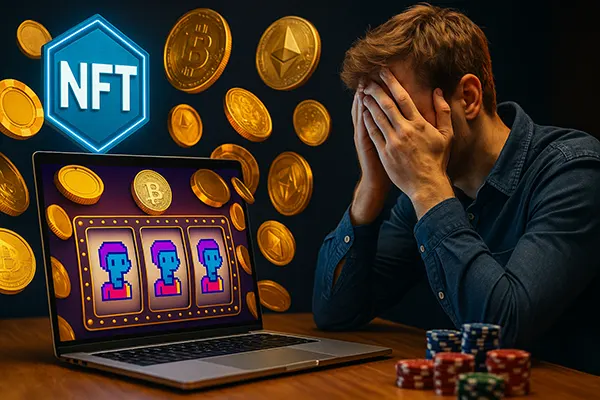In 2024, a new wave of blockchain-based gambling emerged: NFT casinos promising quick wealth and decentralised betting. One of the most dramatic consequences of this trend was the story of a young man from Germany who lost everything to what initially seemed like a revolutionary digital casino experience. His story is not just a cautionary tale — it reflects the broader risks associated with unregulated NFT-based gambling systems that are attracting users globally.
The Rise of NFT Casinos and the Promise of Wealth
Throughout late 2023 and into the first half of 2024, NFT-based gambling became a viral topic in online crypto forums. These casinos offered exclusive tokens, avatars, and even personalised slot machines linked to digital collectibles. For many, this seemed like the future of gambling — personalised, decentralised, and potentially more lucrative than ever.
The key attraction was the belief that NFTs could appreciate in value over time. Gamblers weren’t just playing for immediate wins; they were investing in game-based digital assets. Influencers actively promoted these experiences as “next-gen gambling,” driving thousands of users to register with newly launched NFT casinos operating under little or no regulation.
One such site — operating on the Polygon blockchain — promised daily dividends for NFT holders and featured a “burn-to-win” mechanic that destroyed tokens for the chance of massive jackpots. It was marketed as a community-led initiative, but behind the scenes, several operators were connected to previously failed DeFi schemes.
The Case of Daniel S.: Financial Ruin Behind the Screens
Daniel S., a 29-year-old IT technician from Hamburg, entered the world of NFT casinos through Discord. He initially spent €600 on an NFT that granted him “VIP odds” in the roulette-like game hosted in the casino. Over the next few months, he invested an additional €9,000 — all his savings — hoping to recoup losses by minting rare NFTs with higher win rates.
However, despite his persistent spending and regular play, Daniel never managed to cash out anything of real value. The NFTs he bought quickly depreciated, and the site altered odds through smart contract updates. In June 2024, the developers behind the casino shut down the site without notice, draining liquidity from the linked tokens and leaving users with worthless assets.
Daniel’s final balance showed €0.04 in the native token. Attempts to contact the site’s team were unsuccessful. Community moderators disappeared from Discord, and the casino’s social accounts were deactivated. Daniel later filed a report with local authorities, but due to the decentralised nature of the operation, no compensation was possible. The psychological toll led to months of therapy and a complete disengagement from digital finance.
Deceptive Mechanics and Psychological Triggers
NFT casinos in 2024 often applied game mechanics rooted in behavioural psychology. Randomised rewards, flashing visual cues, and countdown-based incentives were combined with blockchain verification to make users feel more in control, despite the unpredictability of outcomes.
“Mint and spin” features encouraged users to keep creating new NFTs, promising greater odds or access to exclusive rooms. However, the cost of minting increased each time, resulting in higher spending with diminishing returns. These tactics echoed the worst of traditional gambling but were hidden behind complex blockchain jargon.
Moreover, the pseudonymous nature of NFT gambling allowed operators to hide behind decentralised IDs or DAOs, making it nearly impossible for users to track legal ownership or accountability. Regulatory bodies in the EU and UK issued warnings by mid-2024, but enforcement lagged behind, leaving many like Daniel vulnerable.
The Illusion of Community and Trust
To build credibility, many NFT casinos leaned heavily on community marketing. Discord servers were presented as democratic spaces where users could vote on changes or suggest game ideas. In reality, moderators and founders controlled every decision, often manipulating community sentiment with fake user accounts or staged giveaways.
Daniel recalled multiple weekly “success stories” posted by supposed winners, many of whom used stock photos or AI-generated avatars. These testimonials reinforced his belief that large wins were real and achievable. Only after the shutdown did he discover that most of these accounts had never been verified or interacted outside of announcement channels.
Even more concerning was the emergence of “ambassadors” who received NFT kickbacks for promoting the casino on TikTok and Telegram. Their glowing endorsements weren’t marked as sponsored, misleading audiences into believing their praise was genuine.

Legal Grey Zones and the Absence of Oversight
By June 2024, more than a dozen NFT casinos had vanished from the web, leaving behind only devalued tokens and archived screenshots. Unlike traditional casinos, these digital operations often registered offshore or operated via smart contracts with no public-facing team.
Several gambling authorities, including the UKGC and Malta Gaming Authority, issued advisories about “unauthorised NFT-based betting environments.” However, without legal precedents or clear classification for NFT gambling, most enforcement actions stalled.
Victims like Daniel struggled to find legal recourse. Legal experts pointed out that while some NFT casinos technically violated securities laws or consumer protection regulations, proving intent or fraud in decentralised systems remained extremely difficult in court. As of June 2025, no high-profile prosecutions had been announced related to these NFT casinos.
Lessons for 2025: Regulation, Awareness, and Prevention
Daniel’s case — though tragic — became a key example in crypto-gambling forums. It is now frequently cited in discussions about consumer protection and the ethical boundaries of decentralised gambling. Several watchdog organisations have since created blacklists and educational resources for identifying high-risk NFT casino schemes.
In response to such cases, crypto exchanges began delisting tokens linked to discredited casinos. Additionally, NFT marketplaces like OpenSea implemented new verification checks for casino-linked collections. These were small but significant steps toward improving trust and safety in the Web3 gambling space.
Most importantly, Daniel himself now works with an NGO advocating for safer blockchain adoption. He shares his story at conferences and within online communities, helping others spot red flags before it’s too late. His experience highlights the urgent need for ethical innovation in Web3 entertainment — one that prioritises transparency, fairness, and user well-being.
